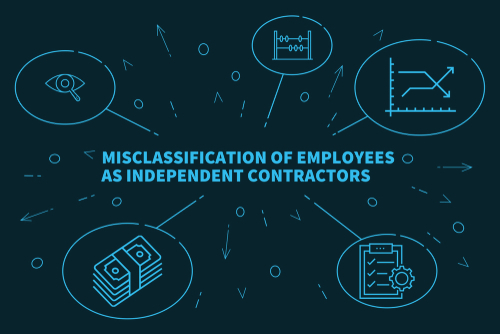Employees in Nevada who are misclassified as independent contractors can either file a wage and hour claim with the Labor Commissioner or sue the employer. Depending on the case, the employee may be able to recover such damages as:
- unpaid wages and interest,
- attorneys’ fees and court costs,
- liquidated damages, and
- punitive damages
Many misclassified employees never speak out because they fear retaliation from their bosses. But if they do not take any action, they lose out on various rights and protections, such as:
- minimum wage and overtime pay,
- workers’ compensation,
- Title VII of the Civil Rights Act of 1964, and
- Family and Medical Leave Act (FMLA)
In this article, our Las Vegas Nevada labor law attorneys discuss:
- 1. Independent contractor definition under Nevada law
- 2. Employers’ obligations to independent contractors versus employees
- 3. What to do if an employer misclassifies an employee as an independent contractor
- 4. Damages for being misclassified as an independent contractor
- 5. Federal law

1. Definition of independent contractor under Nevada law
Independent contractors are self-employed, as opposed to traditional employees. Under Nevada’s wage and hour laws, workers are considered independent contractors if they meet the following three criteria:
- The worker has an employer identification number or social security number, or has filed an income tax return for earnings from self-employment in the previous year (unless the worker is a non-citizen); and
- The worker is required by the contract with the employer to maintain any necessary business licenses and occupational license, insurance, or bonding; and
- At least three of the following five criteria are true:
- The worker can hire his/her own employees;
- The worker has control over the time the work is performed (unless the worker and employer have an agreement about the time);
- The worker controls the means and manner of doing the work and the result of the work;
- The worker is not required to work exclusively for one employer (unless required by law or by a temporary contract); and/or
- The worker makes a substantial investment in his/her own business (including leases and licensing regarding tools and workplaces)1
(Note that Nevada law has separate but similar tests for determining whether a worker is an independent contractor for insurance purposes or workers’ compensation purposes.2)
A worker can still be considered an independent contractor even if he/she does not meet all the aforementioned conditions: The employer would just need to provide other evidence to convince a court that the worker falls outside the bounds of a standard employee.3
Example: Jim hires Ned to paint his house. Jim provides all the tools and instructs Ned when and how he can paint it. Jim also forbids Ned from working elsewhere and hiring help. After the job is done, Ned asks for a W2 form because he believes he was Jim’s employee during the job. Jim refuses and instead gives him a 1099 form, insisting Ned was an independent contractor.
In the above example, a Nevada court might find that Ned was an employee. Even if Jim can show that Ned had a contractor’s license, Jim treated Ned as an employee: Ned lacked control over the work and was dependent on Jim economically.
2. Employers’ obligations to independent employers versus employees

Employers generally have more responsibilities and obligations to employees than independent contractors. This is why employers generally prefer having independent contractors over employees.
Employers’ primary responsibility to independent contractors in Nevada is to pay them as promised for services rendered. In contrast, Nevada employers may have to provide the following ten protections to bona fide employees (depending on the circumstances):
- Pay overtime wages (which may amount to 1.5 times their regular wage rate);
- Pay no less than minimum wages ($12.00 an hour);
- Provide lunch breaks and rest breaks
- Cover the employee under workers’ compensation insurance and disability insurance;
- Cover the employee under unemployment insurance;
- Assist the employee in paying FICA taxes;
- Abide by OSHA (Occupational Safety and Health Administration);
- Abide by the FMLA (Family and Medical Leave Act);
- Abide by the ACA (Affordable Care Act); and
- Abide by Title VII of the Civil Rights Act of 1964 (which prohibits employers from discriminating against employees on the basis of sex, race, color, national origin, and religion) and NRS 6013.330 (which also prohibits discrimination on the basis of sexual orientation and gender identity or expression)
True independent contractors are not entitled to receive workers compensation benefits under Nevada law.
Employers reveal in their tax returns whether they consider a worker an employee or an independent contractor: Employees receive W2 forms whereas independent contractors receive 1099 forms. However, employers do not simply get to choose what category a worker falls under:
Employers may only designate a worker as an independent contractor if the facts support it. The independent contractors tend to cost less and demand less responsibility from employers plays no role in whether a worker qualifies as an independent contractor or an employee.
Example: Mel hires Kay to be his secretary. Mel tells Kay when her work hours are, how to do her job, and provides her with a desk, computer, and phone. Mel forbids Kay to work as a secretary in any other office. Mel does not want to pay payroll taxes or to cover Kay under his insurance policies, so he intends to report Kay as an independent contractor. However, Kay is clearly an employee and is therefore legally entitled to employee benefits.
Even if Kay in the above example signs a contract with Mel agreeing to be an independent contractor, courts still may determine that she qualifies for employee benefits. Courts look to the actual nature of the work relationship (see section 1 above) rather than what the employer claims the relationship is for the purposes of saving money.4
3. What to do if an employer misclassifies an employee as an independent contractor
Employees who are misclassified as independent contractors can first try talking to their employer about the matter. Perhaps the employer made a mistake and would be willing to change the classification. But if the employer ignores the employees’ “good faith effort” to resolve the issue, then the employee may consider filing a claim with the Nevada Labor Commissioner:
Employees may complete the Commissioner’s claim form online (not through fax or email). Employees also have the opportunity to include documents supporting their employee status, including:

- pay stubs
- time records
- receipts
- witness information
After an investigation into the matter, the Commissioner may hold a hearing, which is similar to a trial but on a smaller scale. Finally, the Commissioner can issue a decision ordering the employer to pay the employee all the wages he/she was denied by being misclassified as an independent contractor.
Note that employees have only two (2) years after the employer’s non-payment of wages to file a claim with the Commissioner. Also note that that employees may be able to file a federal claim with the U.S. Department of Labor instead of with the Nevada Labor Commissioner. A labor law attorney can help a worker determine where would be best to file a claim.5
3.1. Lawsuits
Misclassified employees can also consider suing the employer in civil court instead of filing a claim with the Commissioner. Litigation is far more complicated than filing a wage claim, however, so employees are strongly advised to retain experienced labor counsel. Possible “causes of action” may include (among others):
- breach of contract
- unjust enrichment
- bad faith
If there is more than one employee who has been misclassified, then the employees may be able to join together and bring a class action lawsuit against the employer. Just a few years ago in Las Vegas, several exotic dancers formed a class and won its lawsuit against Sapphire nightclub for misclassifying them as independent contractors.6
There are four threshold requirements plaintiffs must bring in order for a judge to recognize a class action lawsuit:
- numerosity – whether there are enough people in the class;
- commonality – whether the plaintiff’s claims are similar enough;
- typicality – whether the named plaintiff in the case is typical of the unnamed plaintiffs in the case (the rest of the class); and
- adequacy of representation – whether the named plaintiffs serve the interests of the rest of the class7
As with filing a claim with the Labor Commissioner, there is a statute of limitations (deadline) for bringing an employee misclassification lawsuit: It can be as soon as two (2) years after the employer’s misclassification, so employees are encouraged to seek legal counsel as soon as possible.8
4. Damages for being misclassified as an independent contractor
Employees who win a lawsuit against their employer for misclassification may be able to recover:

- back pay (including benefits) plus interest
- attorneys’ fees and court costs
- punitive damages, if the employer intentionally misclassified the employee as an independent contractor
In cases involving FLSA (Fair Labor Standards Act) violations, the court may also order that the employer pay liquidated damages. Liquidated damages are equal to the amount of the worker’s unpaid wages plus interest. In short, the worker may be able to recover double damages.9
Scroll down to the next question for more information about federal law and employee misclassifications.
5. Definition of independent contractor under federal law
Unlike Nevada law, the FLSA does not provide a definition of independent contractors. Instead, courts consider various factors, including:
- Whether the relationship between worker and employer is temporary;
- How much control the employer has;
- The extent to which the worker invests in his/her facilities and equipment;
- The worker’s independence;
- The worker’s opportunities for earnings and losses;
- The extent to which the worker’s services are an integral part of the employer’s business; and
- The amount of initiative, judgment, or foresight in open market competition with others necessary for the worker’s success10
In general, Nevada employers must follow both Nevada and federal law when classifying workers. Federal agencies which monitor employee classifications include:
- The Department of Labor’s Wage and Hour Division (WHD)
- The Equal Employment Opportunity Commission (EEOC)
- The Internal Revenue Service (IRS)
Each year these agencies spend millions for the sole purpose of finding employee misclassifications.11
Work in California? See our article on Misclassification of employees as independent contractors in California.
Legal References
- NRS 608.0155 (Nevada Senate Bill 224 (2015)) Persons presumed to be independent contractor. 1. For the purposes of this chapter, a person is conclusively presumed to be an independent contractor if: (a) Unless the person is a foreign national who is legally present in the United States, the person possesses or has applied for an employer identification number or social security number or has filed an income tax return for a business or earnings from self-employment with the Internal Revenue Service in the previous year; (b) The person is required by the contract with the principal to hold any necessary state business license or local business license and to maintain any necessary occupational license, insurance or bonding; and (c) The person satisfies three or more of the following criteria: (1) Notwithstanding the exercise of any control necessary to comply with any statutory, regulatory or contractual obligations, the person has control and discretion over the means and manner of the performance of any work and the result of the work, rather than the means or manner by which the work is performed, is the primary element bargained for by the principal in the contract. (2) Except for an agreement with the principal relating to the completion schedule, range of work hours or, if the work contracted for is entertainment, the time such entertainment is to be presented, the person has control over the time the work is performed. (3) The person is not required to work exclusively for one principal unless: (I) A law, regulation or ordinance prohibits the person from providing services to more than one principal; or (II) The person has entered into a written contract to provide services to only one principal for a limited period. (4) The person is free to hire employees to assist with the work. (5) The person contributes a substantial investment of capital in the business of the person, including, without limitation, the: (I) Purchase or lease of ordinary tools, material and equipment regardless of source;(II) Obtaining of a license or other permission from the principal to access any work space of the principal to perform the work for which the person was engaged; and (III) Lease of any work space from the principal required to perform the work for which the person was engaged.–> The determination of whether an investment of capital is substantial for the purpose of this subparagraph must be made on the basis of the amount of income the person receives, the equipment commonly used and the expenses commonly incurred in the trade or profession in which the person engages. 2. The fact that a person is not conclusively presumed to be an independent contractor for failure to satisfy three or more of the criteria set forth in paragraph (c) of subsection 1 does not automatically create a presumption that the person is an employee. 3. As used in this section, “foreign national” has the meaning ascribed to it in NRS 294A.325.NRS 608.255 Relationships which do not constitute employment relationships for purposes of minimum wage. For the purposes of this chapter and any other statutory or constitutional provision governing the minimum wage paid to an employee, the following relationships do not constitute employment relationships and are therefore not subject to those provisions:1. The relationship between a provider of jobs and day training services which is recognized as exempt pursuant to the provisions of 26 U.S.C. § 501(c)(3) and which has been issued a certificate by the Division of Public and Behavioral Health of the Department of Health and Human Services pursuant to NRS 435.130 to 435.310, inclusive, and a person with an intellectual disability or a person with a developmental disability participating in a jobs and day training services program.
2. The relationship between a principal and an independent contractor.
3. As used in this section, “developmental disability” has the meaning ascribed to it in NRS 435.007.
See also Myers v. Reno Cab Co., Inc. (2021) 137 Nev., Advance Opinion 34 (“[E]mployee status for purposes of the Minimum Wage Amendment to the Nevada Constitution (MWA) is determined only by the “economic realities” test, but employee status for purposes of statutory waiting time penalties for late-paid wages may be affected by the presumption set forth in NRS 608.0155. We reaffirm that a contractual recitation that a worker is not an employee is not conclusive under either test. Finally, employee status for the purposes of either the MWA or NRS Chapter 608 is not affected by the Nevada Transportation Authority’s (NTA) approval of a taxi lease under NRS 706.473.”)
- Terry v. Sapphire Gentlemen’s Club, 130 Nev. Adv. Rep. 87, 336 P.3d 951 (2014)(“Thus, the economic realities test examines the totality of the circumstances and determines whether, as a matter of economic reality, workers depend upon the business to which they render service for the opportunity to work.”).
- NRS 608.0155.
- See Terry v. Sapphire Gentlemen’s Club, 130 Nev. Adv. Rep. 87, 336 P.3d 951 (2014); See, e.g., Yellow Cab Cooperative, Inc. v. Workers’ Comp. Appeals Bd., 226 Cal.App.3d 1288, 1297 (1991).
- See Forms for Employees, State of Nevada Department of Business & Industry Office of the Labor Commissioner.
- Terry v. Sapphire Gentlemen’s Club, 130 Nev. Adv. Rep. 87, 336 P.3d 951 (2014).
- Nevada Rules of Civil Procedure 23.
- Independent Contractor Defined, IRS.
- NRS 11. See also SB 145 (2023).
- 29 U.S. Code § 260.
- See., e.g., Congressional Budget Justification Employment And Training Administration State Unemployment Insurance And Employment Service Operations, Department of Labor.

